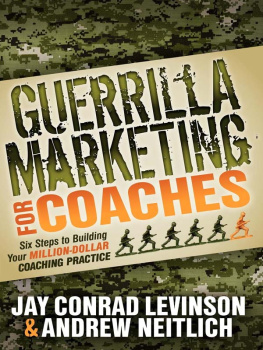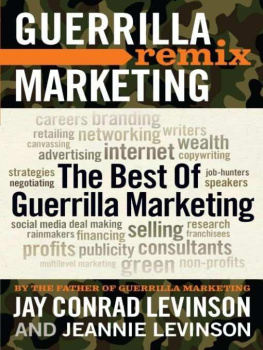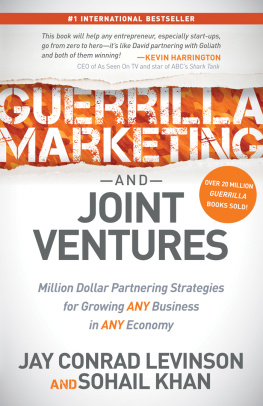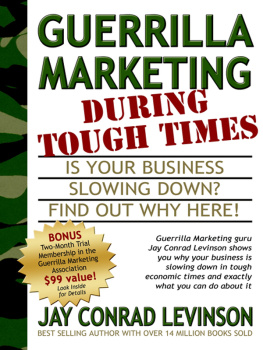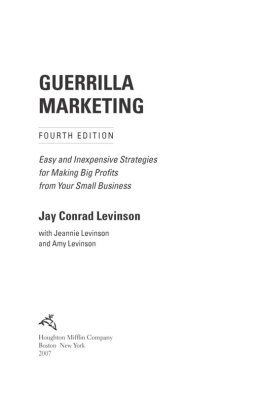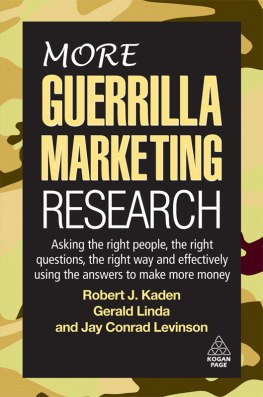Jay Conrad Levinson - Guerrilla Marketing for Coaches
Here you can read online Jay Conrad Levinson - Guerrilla Marketing for Coaches full text of the book (entire story) in english for free. Download pdf and epub, get meaning, cover and reviews about this ebook. year: 2012, publisher: Guerrilla Marketing Press, genre: Home and family. Description of the work, (preface) as well as reviews are available. Best literature library LitArk.com created for fans of good reading and offers a wide selection of genres:
Romance novel
Science fiction
Adventure
Detective
Science
History
Home and family
Prose
Art
Politics
Computer
Non-fiction
Religion
Business
Children
Humor
Choose a favorite category and find really read worthwhile books. Enjoy immersion in the world of imagination, feel the emotions of the characters or learn something new for yourself, make an fascinating discovery.
- Book:Guerrilla Marketing for Coaches
- Author:
- Publisher:Guerrilla Marketing Press
- Genre:
- Year:2012
- Rating:4 / 5
- Favourites:Add to favourites
- Your mark:
- 80
- 1
- 2
- 3
- 4
- 5
Guerrilla Marketing for Coaches: summary, description and annotation
We offer to read an annotation, description, summary or preface (depends on what the author of the book "Guerrilla Marketing for Coaches" wrote himself). If you haven't found the necessary information about the book — write in the comments, we will try to find it.
Guerrilla Marketing for Coaches — read online for free the complete book (whole text) full work
Below is the text of the book, divided by pages. System saving the place of the last page read, allows you to conveniently read the book "Guerrilla Marketing for Coaches" online for free, without having to search again every time where you left off. Put a bookmark, and you can go to the page where you finished reading at any time.
Font size:
Interval:
Bookmark:
ABOUT THE AUTHORS
Jay Conrad Levinson is the author of historys best-selling marketing series, Guerrilla Marketing, plus 58 other business books. His books have sold more than 21 million copies worldwide. His guerrilla concepts have influenced marketing so much that his books appear in 62 languages and are required reading in MBA programs worldwide.
He was born in Detroit, raised in Chicago, and graduated from the University of Colorado. His studies in Psychology led him to advertising agencies, including a Directorship at Leo Burnett in London, where he served as Creative Director. Returning to the USA, he joined J. Walter Thompson as Senior VP. Jay created and taught Guerrilla Marketing for ten years at the extension division of the University of California in Berkeley.
A winner of first prizes in all the media, he has been part of the creative teams that made household names of The Marlboro Man, The Pillsbury Doughboy, Allstates good hands, Uniteds friendly skies, the Sears Diehard battery, Morris the Cat, Mr. Clean, Tony the Tiger, and the Jolly Green Giant.
Today, Guerrilla Marketing is the most powerful brand in the history of marketing, listed among the 100 best business books ever written, and is now a popular website at www.gmarketing.com . It also powers The Guerrilla Marketing Associationa support system for small business.
Although Jay is able to list those notable accomplishments, he believes that the most notable is that, since 1971, he has worked a three-day week from his home.
After living in the San Francisco Bay Area for 35 years, Jay and Jeannie Levinson sold their home, bought an RV, and towed a Jeep. They ended up, six years later, at their lakefront home outside Orlando, Florida, and close to their 26 grandchildren, their own personal Disney World. Nobody on earth is as qualified to tell you about Guerrilla Marketing as the Father of Guerrilla Marketing, Jay Conrad Levinson.
Andrew Neitlich runs a successful coaching and consulting practice and is a leading trainer of executive-level coaches. His coaching practice focuses on leaders in emerging technology, healthcare, universities, non-profits, and professional services firms. He is also the founder and director of The Center for Executive Coaching ( www.centerforexecutivecoaching.com ), The Institute for Business Growth ( www.instituteforbusinessgrowth.com ), and The Center for Career Coaching ( www.centerforcareercoaching.com ). These organizations train coaches and aspiring coaches from around the world to work with executives and business owners.
He is also the executive director of Solo Revolution ( www.solorevolution.com ), a unique association of solopreneurs from around the world who are building businesses and living life on their terms. Andrew received his undergraduate degree from Harvard College in 1987, and his MBA from Harvard Business School in 1991. He lives with his wife, Elena, and three children (Noah, Seth, and Willow) in Sarasota, Florida, where he plays tennis almost every day.
ACKNOWLEDGMENTS
FROM JAY CONRAD LEVINSON
I owe heartfelt acknowledgment to Andrew Neitlich, who did all the heavy lifting and supplied the brilliance with which this book has been written. If you benefit from his insight, give all the credit to him, for I was merely along for the ride. My main contribution has been to provide the guerrilla spirit that has infused him. He has done a wonderful job absorbing it and spreading it to everyone who reads the words he has written.
FROM ANDREW NEITLICH
I remain forever grateful to Jim Reilly, who was generous enough to introduce me to Jay Conrad Levinson. Jay has been a hero of mine for decades, and it continues to be an honor and a highlight of my career to have this opportunity to work with him on a third book.
I am also extremely grateful to the members of The Center for Executive Coaching, Institute for Business Growth, and The Center for Career Coaching. I appreciate your generosity in sharing your stories about building your coaching firms. I am also awed by your persistence and commitment when it comes to building your coaching practices. You continue to raise the bar for the coaching profession, and it is a privilege to get to be able to work with you.
Special thanks to social media expert Crystal McCann of BambuSky for her guidance with the section about Internet marketing and social media. She has helped my wife and me with the social media efforts for our respective businesses, and I am grateful for her knowledge.
Of course, thanks always go to my wife, Elena. She is writing yet another book while I finish this oneexcept that she also manages to do the lions share of work when it comes to getting the kids ready for school and extracurricular activities, keeping the house running smoothly, cooking gourmet meals, and running her own successful business. No married entrepreneur can succeed in business without a supportive spouse, and I am blessed that I am married to Elena. Finally, I want to acknowledge my children, Noah, Seth, and Willow, and wish them satisfaction, joy, peace, and success.
TO LEARN MORE ABOUT ANDREW NEITLICH AND HOW TO BECOME A TOP-TIER EXECUTIVE-LEVEL COACH VISIT:
www.CenterforExecutiveCoaching.com
www.InstituteforBusinessGrowth.com
www.CenterforCareerCoaching.com
For more insights about how to grow your coaching practice, visit:
www.SoloRevolution.com
TO LEARN MORE ABOUT GUERRILLA MARKETING AND JAY CONRAD LEVINSON, VISIT
www.gmarketing.com .

Chapter One
THE OPPORTUNITY IS GREATEST WHEN YOU THINK OF YOURSELF AS MORE THAN A COACH
B efore marketing your coaching practice, the first question you must answer is, Why would anyone hire a coach?
The easy answer is that human resource professionals in many organizationsincluding Fortune 500 companies, governments, foundations wanting to build organizational capacity in the non-profits that they fund, and numerous progressive companieshave discovered the value of coaching. They seek out and hire coaches to develop both current and emerging leaders.
However, if your answer stops there, you limit yourself to competing in a relatively small and highly competitive market. You can make a great living if you have a name like Marshall Goldsmith or John Maxwell; if you are affiliated with a top-tier consulting firm like McKinsey; or if you are part of the leadership development group of one of the few huge, well-regarded executive recruiting firms. If you dont have that kind of name recognition or marketing clout, you might find yourself struggling in this market. To get work, you must compete against the thousands of other coaches out there, all of whom are struggling to get approved by one HR department, and then another, and then another. A second option is that you contract with firms that already have large coaching contracts. In this situation you dont own the client relationship, and you have to accept the often stringent hours and terms that the primary contractor demands from you.
Whichever option you choose, you become a commodity, stuck in the trap of accepting an hourly rate in exchange for a set number of coaching hours. Even worse, when you do get clients through this system, you often find thatdespite what the HR department or the primary contractor might tell youyour direct coaching clients arent especially happy to have you as a coach.
To break out of this trap, you have to generate a deeper answer to why anyone would hire a coach. Unfortunately, this answer might be painful for many traditional coaches to swallow.
If we are honest, the vast majority of people dont want to hire a coach at all, and, despite research to the contrary, they dont believe that coaching adds any value. In my own experience, I have found that eighteen out of twenty executives dont want anything to do with coaching. When I first bring it up, they roll their eyes when they hear the word
Next pageFont size:
Interval:
Bookmark:
Similar books «Guerrilla Marketing for Coaches»
Look at similar books to Guerrilla Marketing for Coaches. We have selected literature similar in name and meaning in the hope of providing readers with more options to find new, interesting, not yet read works.
Discussion, reviews of the book Guerrilla Marketing for Coaches and just readers' own opinions. Leave your comments, write what you think about the work, its meaning or the main characters. Specify what exactly you liked and what you didn't like, and why you think so.

